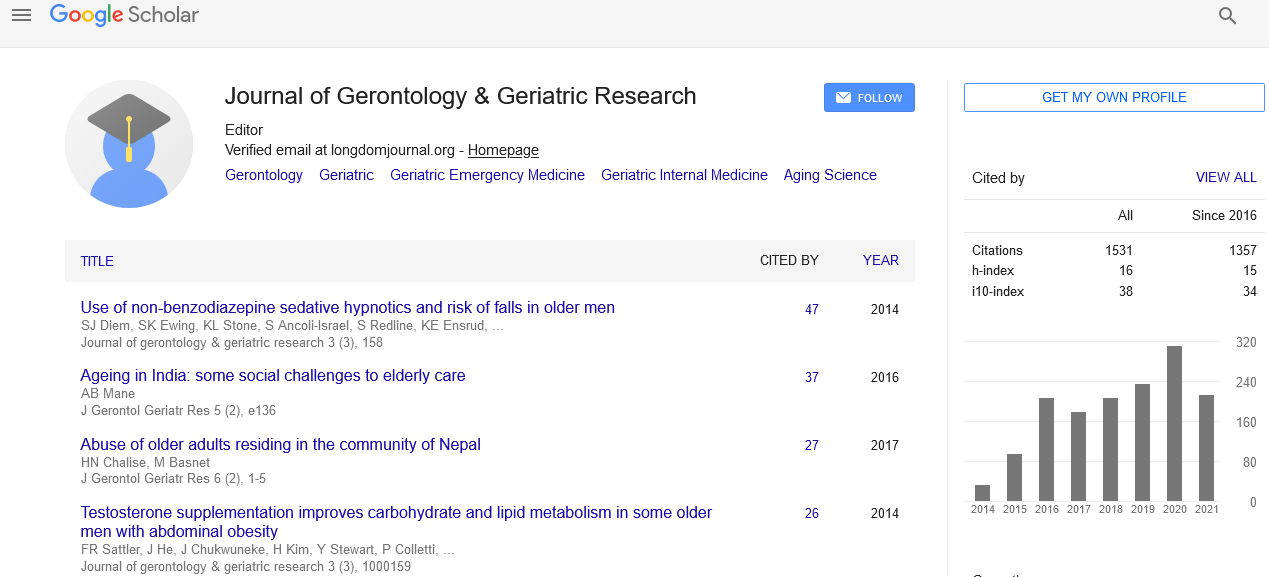PMC/PubMed Indexed Articles
Indexed In
- Open J Gate
- Genamics JournalSeek
- SafetyLit
- RefSeek
- Hamdard University
- EBSCO A-Z
- OCLC- WorldCat
- Publons
- Geneva Foundation for Medical Education and Research
- Euro Pub
- Google Scholar
Useful Links
Share This Page
Journal Flyer

Open Access Journals
- Agri and Aquaculture
- Biochemistry
- Bioinformatics & Systems Biology
- Business & Management
- Chemistry
- Clinical Sciences
- Engineering
- Food & Nutrition
- General Science
- Genetics & Molecular Biology
- Immunology & Microbiology
- Medical Sciences
- Neuroscience & Psychology
- Nursing & Health Care
- Pharmaceutical Sciences
Neuroprotective and memory enhancing potential of Decalepis hamiltonii: A study on wildtype and disease models of Drosophila melanogaster
International Conference on Geriatrics & Gerontology
July 08-10, 2014 DoubleTree by Hilton Hotel Chicago-North Shore Conference Center, USA
SR Ramesh, Mohammad Haddadi, Samaneh Reiszadeh Jahromi and T Shivanandappa
Accepted Abstracts: J Gerontol Geriat Res
Abstract:
The advances in the field of pharmacology and medicine have significantly enhanced life span of humans. However, the progressive neurodegenerative diseases such as Alzheimer?s disease (AD), Parkinson?s disease (PD), tauopathies, lateral sclerosis and various polyglutamine diseases pose a greater problem of agonizing symptoms in the latter part of human life. Though the symptoms and the triggers of these neurodegenerative diseases are different, some common features such as enhanced oxidative damage, defective ubiquitin-proteasome, mitochondrial dysfunction and aggregation of abnormal proteins are characteristic features. Among these, oxidative damage caused by oxidative stress in aging individuals leads to neurodegeneration which affects their well being. Though a permanent cure for these age related disorders is far from reality, the quest for ways and means of alleviating the symptoms continues. We have isolated and characterized novel bio-active molecules viz., DHA I (4-hydroxy isophthalic acid), DHA II (14-aminotetradecanoic acid), DHA III (4-(1-hydroxy-1methylethyl)- 1-methyl-1, 2-cyclohexanediol), DHA IV (2-hydroxymethyl-3-methoxybenzaldehyde), DHA V (2,4,8-trihydroxybicyclo[3.2.1]octan-3-one), and ellagic acid from the edible roots of Decalepis hamiltonii. In our earlier studies on mammalian model and cells in culture, we have shown cytoprotective and neuroprotective potential of D. hamiltonii (Dh) root extract. Our current studies are focused on using employing D. melanogaster wild type and disease models of Alzheimer?s disease and Parkinson?s disease to evaluate the potential of D. hamiltonii. Our studies have revealed that the cocktail of Dh molecules exhibit neuroprotective and memory enhancing potential. Further, we have also found that the cocktail of Dh molecules attenuate the age related decline in cognitive ability and also restores the altered circadian rhythm. Interestingly, we have found that there has been a marked increase in the short term memory of olfaction in the flies born to aged parents that were fed with Dh. With all these ?desirable? properties, we foresee that the Dh cocktail could be a promising ?elixir? of natural origin that can improve the quality of life of the aged.
Biography :
SR Ramesh completed his graduation in 1972, post graduation in 1974 and doctoral degree in 1980 from University of Mysore. He got the position of Asst. Professor at Dept. of Studies in Zoology, University of Mysore, Mysore, India in 1981. The fellowship from Deutscher Akademischer Austausch Dienst (DAAD), Germany enabled him to work as post-doctoral fellow at Institut f?r Genetik, Ruhr Universitat Bochm, Bochum, Germany and to work as visiting faculty with Prof. Dr. Buenemann, Institut f?r Genetik, Heinrich-Heine Universitat, Dusseldorf, Germany. In recognition of his post-doctoral research, his initial research back in India was supported with equipments by Gesellschaft f?r Technische Zusammenarbeit (GTZ), Germany. He became Associate Professor in 1994 and Professor in 1999. In addition to teaching and research, he has co-ordinated a number of National symposia, workshops, refresher courses and orientation programs sponsored by national and state science bodies.


